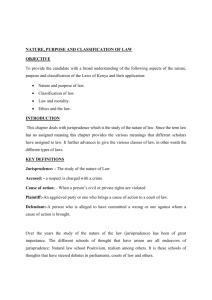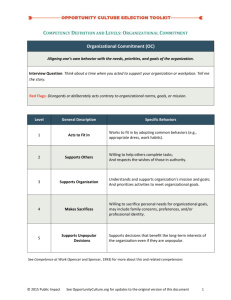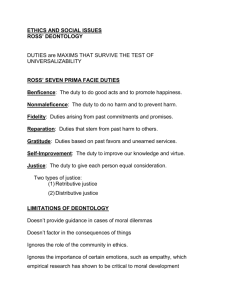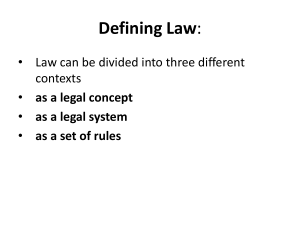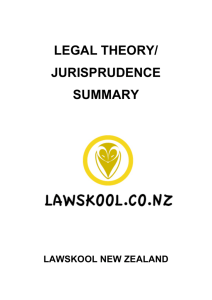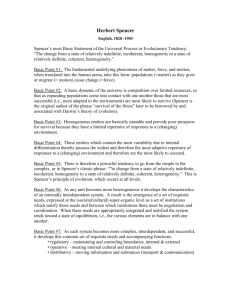There are many ways to classify the law
advertisement
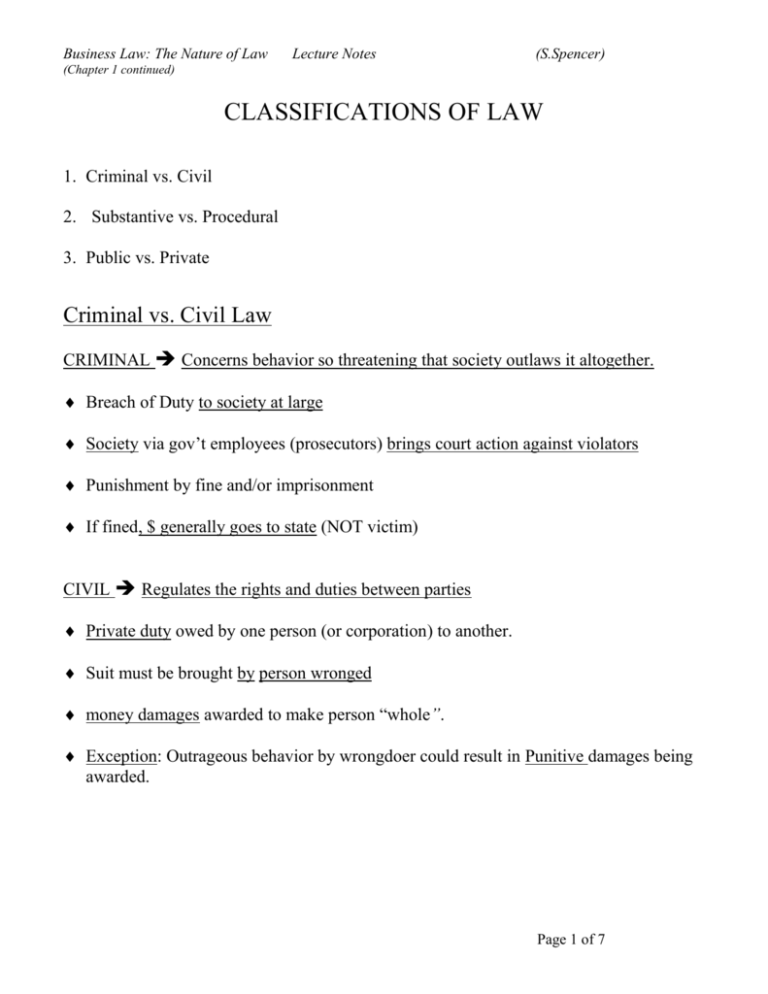
Business Law: The Nature of Law Lecture Notes (S.Spencer) (Chapter 1 continued) CLASSIFICATIONS OF LAW 1. Criminal vs. Civil 2. Substantive vs. Procedural 3. Public vs. Private Criminal vs. Civil Law CRIMINAL Concerns behavior so threatening that society outlaws it altogether. Breach of Duty to society at large Society via gov’t employees (prosecutors) brings court action against violators Punishment by fine and/or imprisonment If fined, $ generally goes to state (NOT victim) CIVIL Regulates the rights and duties between parties Private duty owed by one person (or corporation) to another. Suit must be brought by person wronged money damages awarded to make person “whole”. Exception: Outrageous behavior by wrongdoer could result in Punitive damages being awarded. Page 1 of 7 Business Law: The Nature of Law Lecture Notes (S.Spencer) (Chapter 1 continued) Criminal vs. Civil Law Criminal Case Civil Case Intentional violation of a statute Harm to another person or property (tort), or breach of a contract Prosecutor v. Defendant (gov’t v. accused) Plaintiff v. Defendant (wronged party v. wrongdoer Fines, imprisonment, execution Defendant may have to pay Plaintiff compensatory and punitive damages. Elements Actors Punishment Page 2 of 7 Business Law: The Nature of Law Lecture Notes (S.Spencer) (Chapter 1 continued) Substantive vs. Procedural Law SUBSTANTIVE LAW Defines the rights of people Sets out the rights & duties governing people Duties: typically resemble commands to “Do this” or “Don’t do that”. Establishes rights & privileges PROCEDURAL LAW Establishes the processes for settling disputes. Establishes the rules under which the substantive rules of law are enforced E.g., Rules specifying the types of cases a particular court can decide Rules regarding how a trial is conducted Rules that stipulate how a judgment by a court is to be enforced. Public vs. Private Law PUBLIC LAW Concerns the powers of the gov’t and the relations between gov’t & private parties. Constitutional, Administrative & Criminal law. PRIVATE LAW Regulates the duties between individuals. A framework of legal rules that enables parties to set the rights & duties they owe each other. Courts enforce but only parties to the agreement are required to comply with terms. (e.g., contracts, property, & agency) Page 3 of 7 Business Law: The Nature of Law Lecture Notes (S.Spencer) (Chapter 1 continued) What is the Law? -- Part II How can we define “the law” in general terms (w/o just enumerating a list of things that are considered law)?. Schools of JURISPRUDENCE 1. Legal Positivism 2. Natural Law 3. American Legal Realism 4. Sociological Jurisprudence School of Jurisprudence LEGAL POSITIVISM Definition of Law The commands of a legitimate political authority. The commands of a legitimate political authority that do NOT offend higher law. NATURAL LAW AMERICAN LEGAL REALISM SOCIOLOGICAL JURISPRUDENCE The behavior of public officials as they deal w/matters before the legal system. Umbrella term uniting a wide range of approaches to law. & society study. Page 4 of 7 Business Law: The Nature of Law Lecture Notes (S.Spencer) (Chapter 1 continued) KEY POINTS Legal Positivism “LP”: Law is separate & distinct from morality Validly enacted positive laws should be enforced & obeyed (whether just or not) until they are changed through the legitimate lawmaking process. Results: Sometimes harsh & inequitable but Very predictable in enforcement Natural Law “NL”: One of the oldest & most significant schools of jurisprudence (Aristotle 384 – 322 B.C.) Makes a distinction between the laws governing a nation and “natural law”. Recognizes a “higher law” (set of universal moral rules) that bind all human beings. Therefore, “Natural Law’ applies universally to all mankind. Rejects the “LP” separation of law & morality. Serves as a criterion for evaluating positive law. Results: Unjust positive laws are NOT valid under this view, so no duty to obey. Reality: An unjust law’s supposed invalidity does NOT translate into a “natural law defense”. (e.g., Lynch case) Natural Law judges may take NL views into account when interpreting & applying the law. For example: May read constitutional provisions broadly in order to strike down positive law they regard as unjust May be more likely to let morality influence their interpretation of law Inherent difficulty: May not be uniformity regarding what is “moral” or “immoral”. Key differences between LP & NL: 1. Relationship between law & morality 2. Duty to obey unjust positive laws Page 5 of 7 Business Law: The Nature of Law Lecture Notes (S.Spencer) (Chapter 1 continued) American Legal Realism: Stresses that law must be considered in light of its day-to-day application. Focus: “law in action” vs. “law in books” Decisions more attributable to the discretion, biases & moods of the decision-makers. Since the actions of these officials are what really affects people’s lives, the behavior itself is really “the law”. ALR vs. NL & LP Focus is very different. ALR has little to say about morality or the duty to obey just/unjust PL. Sociological Jurisprudence Each case & legal decision is viewed as a piece of a much bigger & more important puzzle. When interpreting statutes, they look beyond the plain meaning of the words and consider the legislative intent as well as the prevailing social policies. Implication: Stresses the need for law to change and keep pace with the evolution of society. Compared to “NL”: In general, “SJ” recognizes the fact that morals influence the law, however, it is not concerned with the goodness or badness of the law. Exception: Some legal sociologists have a vision for where society is going (or should be going) and make decisions that promote this social agenda. Functions of Law The law serves as a flexible tool for the accomplishment of specific/chosen purposes. Positive: Willingness to adapt law to further social good Negative: Legal instability & uncertainty. Types of Social Functions Served: 1. Peacekeeping 2. Check Gov’t Power & Promote Personal Freedom 3. Facilitate planning & realization of reasonable expectations 4. Promote economic growth & free competition 5. Promote Social Justice 6. Protect Environment Page 6 of 7 Business Law: The Nature of Law Lecture Notes (S.Spencer) (Chapter 1 continued) LEGAL REASONING Q: Why consider legal reasoning? A: Important for understanding how laws are interpreted. LR gives insight into how lawyers & judges think Helps dispel the notion that law is a fixed body of predictable “Black Letter” rules Provides some understanding of the mechanisms by which law responds to social change. Types of Legal Reasoning 1. Case Law Reasoning 2. Statutory Interpretation Case Law: Find appropriate legal rule Standard for selection: Doctrine of Stare Decisis (Chapter 4) If not similar enough, Distinguish case Note: A valid distinguish must exist. E.g., “Employment-at-Will” E.g., Hagan v. Coca-Cola Statutory Interpretation (Chapter 4) Courts face a challenge when interpreting statutes. 1. Natural ambiguity of language 2. Intentional ambiguity by legislature Various techniques of interpretation used to deal with the ambiguity No technique has priority over any other Different techniques yield different results Specific Techniques: 1. Plain Meaning 2. Legislative History & Purpose 3. General Public Purpose (Policy) 4. Prior Interpretations 5. Maxims Page 7 of 7
